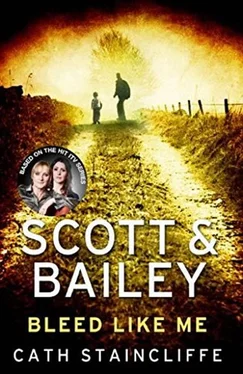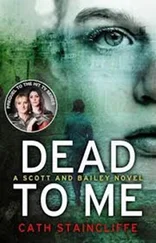Margaret Milne sat at one end of the three-seat sofa but from her eyes Janet could see she was a million miles away. It was Janet’s job to drag her back to the here and now and hoover up all the information she had about her family.
‘My name is DC Janet Scott,’ she said. ‘I’d like you to call me Janet. Can I call you Margaret? Is that okay?’
Margaret Milne gave a nod, blinking as if the light was too bright. First names, the first part of the contract, the bond that Janet would build. The more Margaret trusted Janet, the more fruitful the conversation would be.
‘I’m so sorry for your loss.’ Janet fixed her eyes on Margaret, who turned away momentarily, looking into the corner of the room, away from the sharp sting of reality. Janet kept talking, softly and slowly. ‘I can only imagine how devastated you must be and I wish none of it had happened and we didn’t have to do this, but I need your help. We need your help to try and find Owen and Theo and Harry.’
Margaret nodded. Janet needed her to start vocalizing, to speak, for the longer she stayed mute the harder it would be to draw answers from her. But she wouldn’t exert any pressure. Outside the room, teams were racing against the clock, scurrying around furiously as the manhunt unfolded, but in here time stood still for Janet while she got Margaret Milne to share her stories, to unravel the tangle of her family’s life and perhaps reveal clues as to why Owen Cottam had acted as he did and where he might be.
‘Tell me about Pamela,’ she said.
Margaret took a breath. ‘She’s a lovely girl.’ She tripped over the tense. ‘Never any trouble.’ A pause. Janet waited, gave half a smile.
‘Always in work.’
Janet thought momentarily of her own mother. If Geoff Hastings had succeeded, how her mum would have framed it. Couldn’t wish for a better daughter but I never wanted her to join the police. She could have done anything: teaching or law or been a professor. Very bright – but she wouldn’t listen. Went her own sweet way. And now. And her two girls … Janet squashed the voice in her head and concentrated on Margaret, who was now finding her stride, her words a little less jerky. Forty years of a life to convey, forty birthdays, three children, all those milestones and setbacks and the level times in between.
‘They met in the Lake District,’ Margaret was saying. Then she hesitated. ‘He was managing the bar at the hotel-’
‘Owen,’ Janet murmured, seeing the name was becoming poisonous to Margaret. But censorship would not help the flow.
She nodded. ‘Owen.’ Her chin trembled. ‘Pamela was maître d’ – in the restaurant. They got married up there, in the Lakes, and Penny was born. They had a little house in the grounds. It was lovely,’ she said, then again as if puzzled by the senseless reversal of circumstances, ‘it was lovely.’ No doubt thinking, how did we get from there to here, from that to this?
‘Penny was born in 2000,’ Janet nudged her gently.
‘After that they took over a pub in Birkenhead. And when that closed they moved here. To the Journeys.’
Janet knew that they were tenant landlords, and that the tenant leased the premises and the equipment and stood any profit or loss. She also knew that pubs were closing in epidemic proportions.
‘Theo was born in 2009 and then Harry the year after,’ Margaret said.
‘Any reason for the gap – nine years after Penny?’ Janet asked.
Margaret shook her head. ‘It just didn’t happen. I think they wanted to get on their feet at first, so they waited a while, and then when they did try again…’
Janet smiled.
‘Michael moved in then, just before Harry came along. He wasn’t getting anywhere at home. He’s got learning difficulties; mild, but… he couldn’t really manage on his own.’ She shook her head. ‘And we’re out in the sticks. Nothing for him there-’ Again Margaret broke off, the brutal truth knocking her sideways again. If Michael hadn’t come to live with his sister, he’d still be alive. Margaret would still have one child left.
‘So Michael moved in,’ Janet said.
‘He started helping out over Christmas and stayed. I’d say it was great for Pamela, especially with the little ones; she didn’t need to do as much in the bar. Though it’s always the same if you live and work in the same place, never really off duty.’
Janet nodded. ‘What did you make of Owen?’
‘I thought he was grand.’ Tears swam in her eyes. ‘Put in the hours, hard worker, always liked them looking nice, the children and Pamela.’
When she didn’t elaborate Janet said, ‘And how were things between Pamela and Owen?’
‘Good,’ but Janet caught an echo of doubt and waited so that Margaret carried on. ‘He liked things doing the right way. Bit of a perfectionist. They’d the odd row about that sort of thing.’
‘Recently?’ There was something there: Janet could practically smell it in the air, in the hesitation.
‘Things were hard, the business side.’ Margaret frowned, ripples across her brow. ‘He worried,’ she said.
‘Was he ever violent?’
‘No, she never said. Just, you know, a bit of a shout now and again. What man doesn’t?’
Janet could hear the undercurrent running beneath the flow of words. The sickening dawning prospect that the odd row and a bit of a shout had mounted up to mayhem, slaughter, murder.
‘I have to ask you this, I’m sorry,’ Janet said. ‘Were either Owen or Pamela involved with anyone else?’
‘No,’ Margaret said emphatically.
‘They were married for eighteen years,’ Janet said. ‘That’s a good while. Were there ever problems?’
Margaret shook her head. ‘No, not between them.’
‘Thank you. And what about alcohol? Drugs? Any problems for either of them?’
‘No, not a problem, but Owen liked a drink.’
Janet tried to unpick the phrase. Liked a drink as in an odd tipple or glued to the bottle?
‘How was he when he was drinking?’
‘How do you mean?’
‘Did it alter his mood, his behaviour?’ Not wanting to put words in Margaret’s mouth, or ideas in her head.
‘He was quieter; the same, really. Perhaps a bit… short-tempered.’
‘Like what?’
‘If the children were being bold, or noisy, he might tell them off. That’s all.’
Janet recognized the Irish turn of phrase. Bold meaning naughty. The Irish the biggest immigrant population in Manchester, something like a third of the citizens having some Irish blood. Janet had, through her father’s side. Still heard Irish accents often and particular words that differed from English. Running messages meant going on errands. Janet had once been told drugs were hidden in the hot press – Irish for the airing cupboard.
A depressed drunk then. Someone whose troubles magnified with each tot. ‘Would he drink at work?’ Janet asked.
‘Yes,’ Margaret said. ‘To be sociable. Not too much.’
‘Did Pamela ever say anything about his health?’
‘No. I don’t think he went to the doctor’s in all the time I’ve known him.’
‘You mentioned things being hard with the business. What can you tell me about that?’ Janet asked.
‘Just with the recession and that. People have less money in their pockets and there’s a lot out of work round there,’ Margaret said.
‘On the Larks?’
Margaret nodded.
‘They were settled there?’
‘Oh, yes. They’d no plans to leave. Penny had just gone up to secondary school. They’d not want to uproot her.’
‘Did you ever hear of Owen being involved in anything illegal?’ Janet said.
‘No, no – he’d have no truck with that sort of thing.’
Читать дальше












